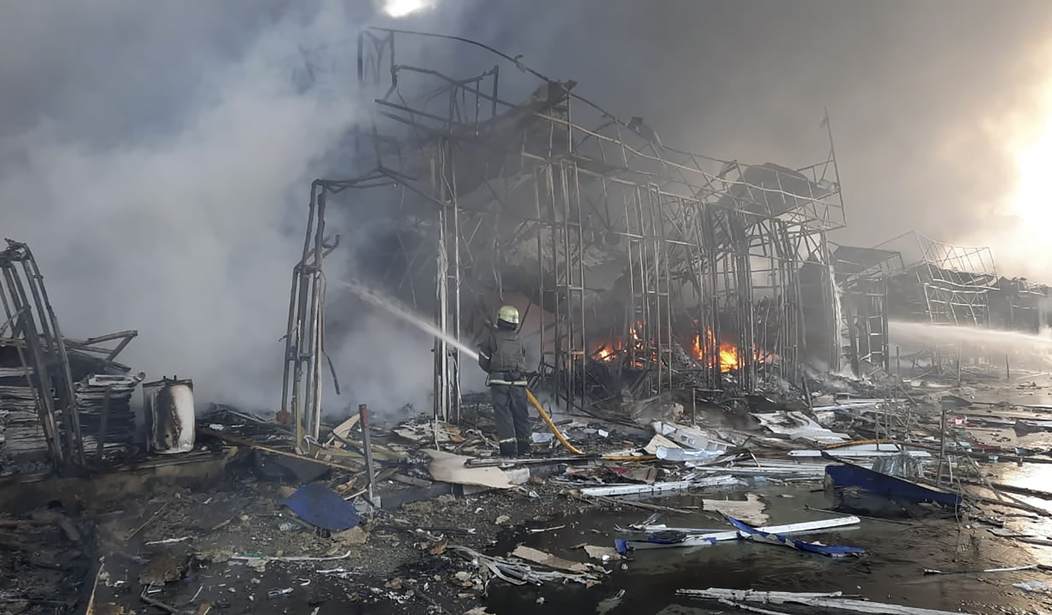One odd thing about Vladimir Putin’s Victory Day speech was that he didn’t even utter the word “Ukraine” once, though he made multiple oblique references to the ongoing invasion. And despite his twisted narrative about how Russia “had no choice” but to take this action, that’s probably not surprising. He couldn’t really crow about his “success” in Ukraine because there hasn’t been much for him to brag about. His attacks in the Donbas region are close to being mired in the mud and what was expected to be a concentrated offensive is slowing to a crawl. But there were still plenty of attacks taking place. The shelling of the port city of Odesa is continuing today, though the Ukrainians are refusing to surrender. One of the border guard leaders in Donbas told the press that the defenders are doing everything possible to make the nation proud. In a nearby city, another school was found to have been destroyed with an unknown number of casualties. The war crimes continue apace. (Associated Press)
Meanwhile, on the ground, intense fighting raged in Ukraine’s east. In the south, the vital Black Sea port of Odesa came under repeated missile attack. And Russian forces sought to end the resistance of Ukrainian defenders making their last stand at a steel plant in Mariupol.
One of the Ukrainian fighters holding out at the steel plant said they were still defending the city.
Valeri Paditel, who heads the border guards in the Donetsk region, said the fighters were “doing everything to make those who defend the city in the future proud.”
While the Ukrainians are far from being out of the woods, even the fate of the Russians in the eastern region of the country is now uncertain. One Scottish strategic military analyst, Phillips P. O’Brien, said today that Russia simply cannot afford a “long war” in Ukraine. He added that “the clock is ticking” for Russia in terms of achieving anything that could realistically be described as a “victory” in this conflict. Sooner or later, the Russians will begin running out of military hardware and competent troops to employ it.
Back at home in Moscow, signs of growing dissent against the invasion showed up during the Victory Day celebrations. The editors of a pro-Kremlin media outlet briefly published several stories criticizing Putin and his war. They were later removed, but that should still have been an alarming development for Putin. If he can’t keep control of his own state-controlled media, he can’t lock down his messaging. And the more the Russian citizens learn about what’s really been going on in Ukraine, the less likely they will be to support Putin.
Meanwhile, in what could be a major development in this war, Finland and Sweden are about to decide on NATO membership.
If Finland’s president and the governing Social Democrats in both countries come out in favor of accession in the next few days, NATO could soon add two members right on Russia’s doorstep.
That would be a historic development for the two Nordic countries: Sweden has avoided military alliances for more than 200 years, while Finland adopted neutrality after being defeated by the Soviet Union in World War II.
NATO membership was never seriously considered in Stockholm and Helsinki until Russian forces attacked Ukraine on Feb. 24. Virtually overnight, the conversation in both capitals shifted from “Why should we join?” to “How long does it take?”
Neither country has scheduled a referendum on joining NATO yet and there are still political leaders in both nations who are opposed to applying. They fear that their countries would be left vulnerable in the period between voting to join and formally being invited into the alliance. But if this happens, it will be the biggest indicator that Putin’s machinations have backfired on him. His entire excuse for attacking Ukraine was his demand that NATO stop it’s spread toward Russia’s borders. But if those two countries enter the alliance, Russia will be entirely encircled to the west and North by NATO member countries. Ukraine might be the last non-NATO country on Putin’s borders in that direction, and he’s already failed to overthrow the government there.
The flip side of this coin (when it comes to Finland and Sweden) is that this could once again turn out to be the straw that breaks the camel’s back. Putin has repeatedly threatened to nuke some European capitals if NATO expands further. And I am no longer at all confident that he’s just bluffing.








Join the conversation as a VIP Member